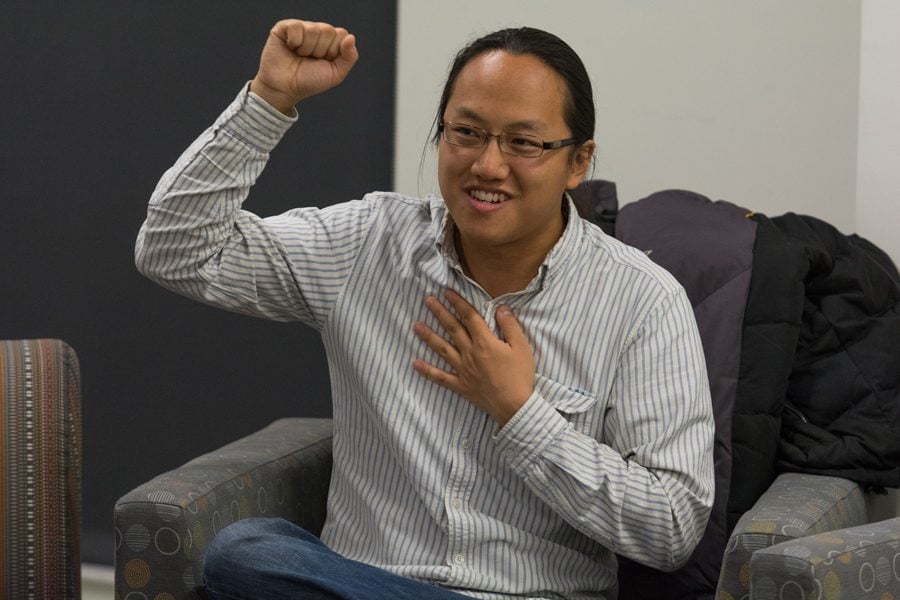Organizers discuss social justice at Neighbor2Neighbor event
Oreste Visentini/The Daily Northwestern
Ted Miin gestures to emphasize a point during the Justice Talk. Miin and Kelly Benkert spoke Thursday at the social justice event organized by the Neighbor2Neighbor initiative.
November 3, 2017
Before he became involved in social work, community organizer Ted Miin said he started at a corporate job. However, he became jaded by capitalist attitudes at work and left his position to start volunteering, he said.
“I moved to Rogers Park, just across the way here, and said, ‘I want to build a relationship with this community,’” Miin said. “I started volunteering and getting to know folks.”
Now a community organizer for A Just Harvest –– a Rogers Park nonprofit that combats poverty and hunger –– Miin talked about the importance of community involvement in 1838 Chicago on Thursday with Kelly Benkert, Northwestern’s director of leadership and community engagement. The event was part of Justice Talks, a series of community dialogues hosted by the new Neighbor2Neighbor program. The initiative was created this year to promote student engagement in Chicago.
Miin said as an organizer, he brings people together. He stressed the importance of knowing the local community because people will listen if they feel like they are being heard.
“I’m not interested in telling people what to do or having them believe what I believe,” he said. “I’m interested in building a community where we can move forward with and advance what our values are.”
Miin said it is important as an organizer to get more people involved in working for the good of the community. He added that by establishing a personal stake in the community, it is easier to get other community members involved.
While activism revolves around a “rapid response” of quick mobilization for a cause, Benkert said, organizing works toward building a long-term, sustained engagement.
Students inspired by social justice can join the Advocacy Corps, Benkert said, a program run by the Office of Leadership Development and Community Engagement. The program — formerly known as the Social Justice Advocacy Fellowship — spans two quarters and meets twice weekly.
Weinberg junior Talia Waxman told The Daily she is passionate about social justice and community health, and came to the event looking to learn more.
“Just hearing them grapple with the challenges of managing power dynamics and building really genuine relationships and centering the voices of community members … hearing their thought process on that was really interesting,” she said.
McCormick freshman Edward Fennell told The Daily he has attended previous Justice Talk events, and that they do a good job of increasing awareness of social justice issues. Fennell added he appreciates the personal insight that professionals can provide based off their own experiences.
“They bring in people who have these experiences and have the knowledge,” Fennell said. “Not the research, not the ‘I think this happens,’ but the actual experience to talk about these issues.”
Though only about 10 people showed up for the talk, Miin said the diverse audience “really warms my heart.”
“Two generations ago, this room would have been an anomaly,” Miin said. “Four generations ago, this room would have been science fiction. And it’s folks like us who have fought for the values that we hold strongly … that have made this room a possibility.”
Email: [email protected]
Twitter: @john_cameron001


